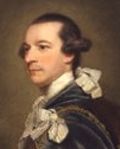Charles Watson-Wentworth was the son of the 1st Marquess of Rockingham, whose family was descended from the Watsons of Rockingham Castle, Northamptonshire, known as prominent Yorkshire Whigs. He received education at Eton and some sources say he went to St. John's College, Cambridge, but this cannot be substantiated. Watson-Wentworth succeeded his father as Marquess of Rockingham in 1750 and spent his entire parliamentary career in the House of Lords. He resigned from his various non-ministerial offices in 1762 in protest at the removal of the 4th Duke of Devonshire from the Privy Council, but from the factional intrigues that ensued, he ultimately emerged as a new prime minister in July 1765, when he was appointed (13 Jul 1765) First Lord of the Treasury. This first period in office was dominated by the Stamp Act controversy, and came to an end when the King replaced him with the Earl of Chatham. The 'Rockingham Whigs', in Government and Opposition, displayed the first signs of a modern political party, not only by promoting a political program, but also seeking to carry it through in office, even to the extent of overturning existing policies of his predecessors. He opposed Lord North's American policy, preferring to grant the colonists their independence. In 1782 Rockingham succeeded North as First Lord of the Treasury and prime minister in alliance with the Earl of Shelburne. His second brief premiership was marked by the repeal of the Declaratory Act, which made laws passed by the Westminster Parliament binding on Ireland, and by continuing military reverses in North America. He died of influenza on 1 Jul 1782. Biography source: [1, pp. 39-44] |

